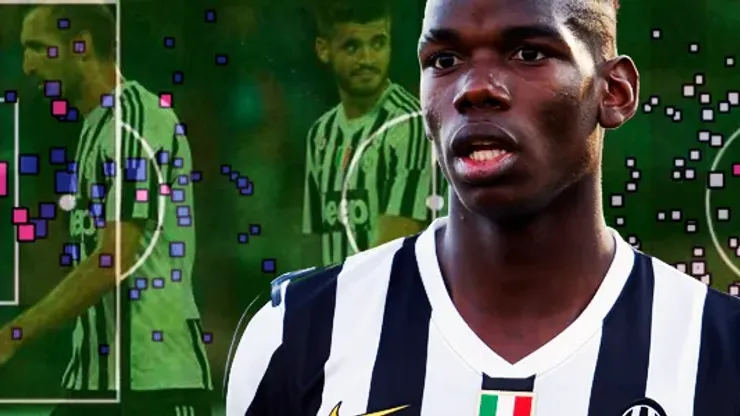Last season, Juventus were in the UEFA Champions League final. They won Serie A. Now the same Juventus are mired in 15th place in Italy with just five points from six matches. What’s gone wrong? Can the Old Lady recover?
Statistical indicators suggest Juventus are playing better than their results. While Max Allegri’s side have won only a single league match, they have consistently created better scoring opportunities than their opposition. Juventus have attempted nearly double the number of shots as their opponents (119 to 59), and importantly, they’ve attempted far more shots from dangerous positions, near to goal.
SEE MORE: Forget scudetto talk, Buffon tells Juventus.
To measure a club’s scoring chances created, I use the statistic “expected goals,” which estimates the quality of shooting chances based on location on the pitch, the type of assist pass, the kind of attack leading to the shot, as well as a variety of other factors. A shot from six yards out, assisted by a through-ball following a counterattack, has a much higher “expected goals” value than a shot from 25 yards following some unremarkable possession play.
In the following graphic, Juventus’ shots are marked in white, their opponents’ in blue. The size of the marker represents the estimated expected goals value of the chance. Goals are pink.
(Three of Juventus’ six goals came from either a penalty or an own goal and are not displayed on the map.)
That array of big white squares shows good scoring chances that Juventus have spurned. Paul Pogba has attempted 23 shots, including three characterized as “big chances” which he should have been expected to finish, yet Pogba has just one goal so far.
Last year, from 54 shots and six big chances, Pogba scored eight times. He is an unquestionably skilled finisher, but along with the rest of his Juve teammates, the French midfielder is struggling to convert chances.
Historically, these slumps rarely last. In my database, I looked for teams similar to Juventus who had good expected goals numbers early but lacked the results to match. Pogba and his teammates have created chances estimated at about 10 expected goals while conceding only four expected goals in scoring chances to their opponents. Despite this, Juventus’ goal difference is minus-one, a difference between xG and GD of about seven goals.
SEE MORE: Serie A’s added some much-needed uncertainty at the top of its table.
I found 12 clubs who had similarly good underlying numbers but a gap between real and expected goals of at least five. Those teams historically bounced back strongly from their slow starts. Of the 12, 10 clubs finished in a higher league position than they were in at the six-week point; only one finished lower.
On average, these clubs made up six places in the table. Though they averaged slightly negative goal difference in their first six matches, just like Juventus, they averaged a plus-17 goal difference over the remainder of their league matches.
This graphic shows the points per match these clubs took in their first six matches, during the early finishing slump, compared to how they performed over the rest of the season.
This group includes some of the great comeback stories of the last five years. Udinese marched from 20th at the end of Sept. 2010 to finish fourth in Serie A. Arsenal roared back to third place and another Champions League berth after a slow start to their 2011 Premier League campaign. Everton and Marseille both went from 20th to the top half of their leagues, while Paris Saint-Germain and AC Milan won their league titles going away after facing some early competition.
If you want to find a team that could turn around a slow start and dramatically wipe out an early deficit, look for a team underperforming their expected goals. The method is not perfect — Almeria in 2010-2011 were relegated, and perhaps nothing could save Milan from themselves in 2013-2014 — but overall, the indicators look very good for Juventus.
There is one important note of caution, though. The only two league champions here were not as far back as Juventus is now. Milan and PSG were both in the top four despite their slow starts, so they did not have nearly as high a hill to climb. Real Madrid won nearly all their remaining matches, but it was not enough to seriously challenge for the La Liga title after a sixth place start.
Juventus in comparison have dropped all the way to 15th. The evidence of clubs with similar problems in past seasons portends good results around the corner, but to win the league title after such a slow start may already be too much to ask.
All data provided by Opta.
200+ Channels With Sports & News
- Starting price: $33/mo. for fubo Latino Package
- Watch Premier League, Women’s World Cup, Euro 2024 & Gold Cup
The New Home of MLS
- Price: $14.99/mo. for MLS Season Pass
- Watch every MLS game including playoffs & Leagues Cup
Many Sports & ESPN Originals
- Price: $10.99/mo. (or get ESPN+, Hulu & Disney+ for $14.99/mo.)
- Features Bundesliga, LaLiga, Championship, & FA Cup
2,000+ soccer games per year
- Price: $5.99/mo
- Features Champions League, Serie A, Europa League & Brasileirāo
175 Premier League Games & PL TV
- Starting price: $5.99/mo. for Peacock Premium
- Watch 175 exclusive EPL games per season






